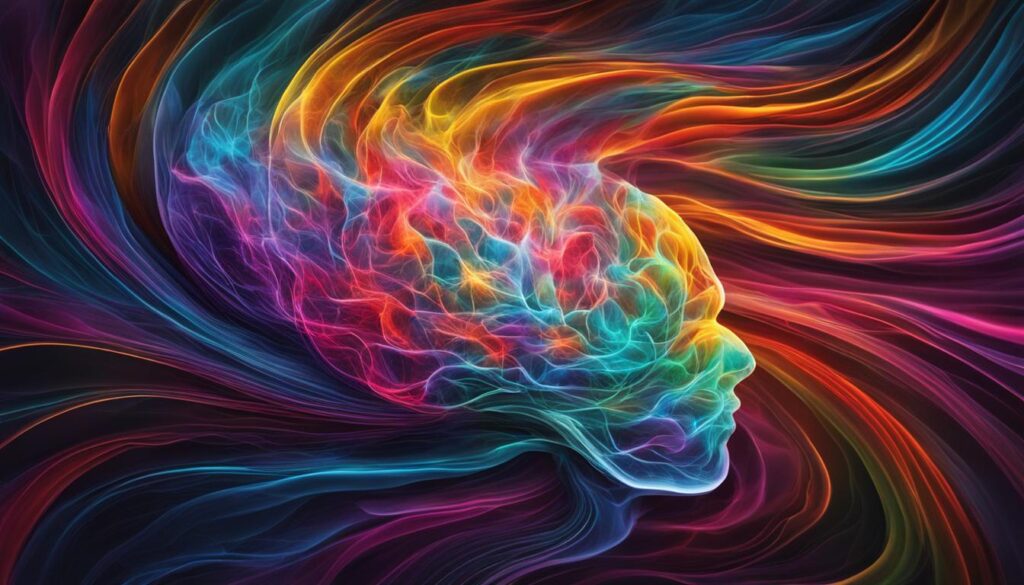Welcome to the world of visualization techniques, where the power of your imagination can unlock your true potential and help you achieve your goals. Visualization is a powerful process that taps into the incredible capabilities of your brain, allowing you to manifest your desires and create the life you envision. By harnessing the power of visualization, you can tap into your subconscious mind, build confidence, improve focus, and find creative solutions to challenges.
Visualization techniques come in various forms, from simple practices like creating a vision board to more advanced methods like detailed visualization. These techniques can be tailored to suit your needs and preferences, ensuring that you find the most effective approach for unlocking your potential.
With visualization, you can train your brain to recognize patterns and opportunities related to your goals, increasing your chances of success. The science behind visualization reveals that our brains are capable of forming strong neural pathways when we visualize our goals, rewiring our brain and enhancing our performance in various aspects of life.
Are you ready to embark on a journey of self-discovery and transformation? Join us as we explore the world of visualization techniques and uncover the potential within you.
Key Takeaways:
- Visualization techniques tap into your imagination to manifest your goals.
- Practicing visualization can help you focus, build confidence, and find creative solutions.
- There are various visualization techniques, from vision boards to detailed visualization.
- Visualization rewires your brain and enhances your performance in different areas of life.
- Embark on a journey of self-discovery and unlock your true potential with visualization techniques.
The Science Behind Visualization
Visualization techniques are deeply rooted in psychology and neuroscience. Understanding the science behind visualization can shed light on why it is such a powerful tool for achieving our goals. From a psychological perspective, visualization allows us to tap into the power of our thoughts and beliefs to shape our reality. By visualizing our desired outcomes, we can improve our focus, motivation, and confidence.
On the neurological level, visualization works by creating neural pathways in our brains. When we consistently visualize our goals, our brains form connections that strengthen the association between our thoughts, emotions, and actions. This process, known as neuroplasticity, allows us to rewire our brains, making it more likely for us to achieve our goals.
Research also shows that visualization can bridge the gap between conscious thought and unconscious behavior. It helps us identify and challenge limiting beliefs and habits that may be holding us back from reaching our full potential. By visualizing success, we can train our brains to recognize patterns related to our goals and seek out opportunities that align with them.
Visualization is a powerful tool that can reprogram the subconscious mind and activate the brain’s natural ability to manifest our goals..
By understanding the psychology and neuroscience behind visualization, we can harness its full potential. Visualization allows us to tap into the power of our minds and shape our reality, making it an invaluable tool for personal growth and success.
The Science Behind Visualization
| Psychology | Neuroscience |
|---|---|
| Visualization taps into the power of our thoughts and beliefs to shape our reality. | Visualization creates neural pathways that strengthen the connection between our thoughts, emotions, and actions. |
| It helps improve focus, motivation, and confidence. | Neuroplasticity allows us to rewire our brains and make it more likely to achieve our goals. |
| Visualization bridges the gap between conscious thought and unconscious behavior. | It helps challenge limiting beliefs and habits and seek out opportunities related to our goals. |
The Benefits of Visualization Techniques
Visualization techniques offer a wide range of benefits, making them a valuable tool for success and motivation. By engaging in visualizations, individuals can tap into the power of their imagination and unlock their full potential. Here are some of the key benefits of visualization techniques:
- Enhanced Performance: Visualization techniques have been shown to improve performance in various areas, including sports, academics, and professional endeavors. By visualizing success and mentally rehearsing desired outcomes, individuals can strengthen their skills, build confidence, and improve overall performance.
- Motivation and Goal Setting: Visualization techniques can be a powerful tool for motivation. By visualizing their goals as already achieved, individuals can stay focused, committed, and motivated to take consistent action towards achieving their desired outcomes. This helps maintain a positive mindset and overcome obstacles along the way.
- Reduced Stress and Anxiety: Visualization techniques can help individuals manage stress and anxiety by creating a mental escape and fostering a sense of relaxation. By visualizing peaceful and calming scenarios, individuals can reduce stress levels, promote a sense of well-being, and improve overall mental health.
- Improved Health and Well-being: Visualization techniques have been shown to have a positive impact on physical health. By visualizing a desired state of well-being, individuals can enhance their immune system, reduce pain, and promote healing. Visualization can also be used to develop healthy habits, such as exercising regularly or eating nutritious foods.
These are just a few of the many benefits that visualization techniques offer. Whether you want to achieve success in your personal or professional life, overcome challenges, or improve your overall well-being, incorporating visualization techniques into your daily routine can make a significant difference.

Different Types of Visualization Techniques
Visualization techniques offer a variety of methods and tools to help manifest our goals and desires. By exploring different approaches, individuals can find the techniques that resonate most with them and enhance their visualization practice. Here are some of the different types of visualization techniques:
Vision Board
A vision board is a powerful visualization tool that involves creating a collage of images, words, and notes that represent your goals and aspirations. By surrounding yourself with visual reminders of what you want to achieve, you activate your subconscious mind and reinforce your intentions. Place your vision board in a prominent location where you can see it daily, allowing it to inspire and motivate you.
Guided Visualization Meditations
Guided visualization meditations are audio recordings that lead you through a step-by-step visualization process. These meditations often incorporate soothing music, calming narrations, and vivid imagery to engage your senses and deepen your visualizations. By following along with the guided meditation, you can enhance your focus, relaxation, and manifestation abilities.
Index Cards
Index cards can be a practical visualization tool, especially for those who prefer a tangible approach. Write down your goals and aspirations on individual index cards and carry them with you throughout the day. Take a moment to visualize yourself achieving each goal whenever you look at the index cards. This technique helps reinforce your visualizations and keeps your goals at the forefront of your mind.
Detailed Visualization
Detailed visualization involves immersing yourself in a vivid mental scenario of achieving your goals. Instead of just visualizing, engage multiple senses and emotions to make your visualizations more realistic and impactful.
Imagine the sights, sounds, smells, and feelings associated with your desired outcome. By adding detail and depth to your visualizations, you strengthen the neural connections in your brain and reinforce your belief in your ability to achieve your goals.
By exploring different visualization techniques, individuals can find the methods that resonate most with them and enhance their visualization practice. Whether it’s creating a vision board, practicing guided meditations, using index cards, or engaging in detailed visualizations, these techniques can empower individuals in manifesting their goals and desires.
Famous Examples of Visualization Techniques
Visualization techniques have been utilized by numerous famous individuals to achieve their goals and reach exceptional levels of success. Athletes, in particular, have embraced visualization as a tool to enhance their performance and mental focus. Let’s take a look at some of the famous athletes who have utilized visualization techniques to excel in their respective sports.
LeBron James, the legendary basketball player, is known for his dedication to visualization. He has spoken openly about how he visualizes every aspect of his game, from his shooting technique to his overall strategy on the court. By visualizing his success, James primes his mind and body for optimal performance.
Kobe Bryant, another prominent basketball player, also practiced visualization throughout his career. He would mentally rehearse each move and scenario before hitting the court. This practice allowed Bryant to tap into his instincts and make split-second decisions with confidence and precision.
In the world of soccer, Carli Lloyd, a highly accomplished athlete, has attributed her success to the power of visualization. She visualizes herself scoring goals, making precise passes, and leading her team to victory. This mental preparation has played a pivotal role in her achievements on the field.
Michael Phelps, the most decorated Olympic swimmer of all time, is known for his use of visualization techniques. Before diving into the pool, Phelps visualizes every stroke, turn, and finish, effectively programming his mind for success. This mental rehearsal has helped him secure multiple gold medals and break numerous world records.
These examples highlight the effectiveness of visualization techniques in the realm of sports. By harnessing the power of their minds, these athletes have been able to unlock their full potential and achieve remarkable feats. Their success serves as a testament to the transformative impact of visualization techniques in achieving extraordinary goals.
| Athlete | Sport |
|---|---|
| LeBron James | Basketball |
| Kobe Bryant | Basketball |
| Carli Lloyd | Soccer |
| Michael Phelps | Swimming |
These athletes have demonstrated the power of visualization techniques in honing their skills, staying focused, and achieving their goals. Whether in sports or any other area of life, visualization techniques can be a game-changer in unlocking our full potential.
The Origins of Visualization Techniques
Visualization techniques have a rich history that can be traced back thousands of years. One of the earliest references to the power of visualization comes from the Roman statesman Cicero, who spoke about using the “mind’s eye” to create mental images. This concept laid the foundation for the development of visualization techniques as we know them today.
Furthermore, visualization can also be found in ancient Buddhist practices, where it has been used for over two millennia as a form of meditation and mindfulness. Buddhist monks have long recognized the power of visualizing positive outcomes and intentions to cultivate inner peace and clarity of mind.
“The only limit to our realization of tomorrow will be our doubts of today. Let us move forward with strong and active faith.” – Franklin D. Roosevelt
In more recent times, visualization techniques gained popularity through books like Shakti Gawain’s “Creative Visualization,” which introduced them to a wider audience. This seminal work emphasized the importance of harnessing the power of the mind to manifest one’s goals and desires. Since then, visualization techniques have continued to evolve and adapt, becoming widely recognized as a valuable tool for personal growth and success.
| Time Period | Key Milestones |
|---|---|
| Ancient Times | The concept of visualization is introduced by Cicero in ancient Rome. |
| Over 2,000 Years Ago | Buddhist monks practice visualization as a form of meditation and mindfulness. |
| 1978 | Shakti Gawain publishes “Creative Visualization,” popularizing visualization techniques. |
The origins of visualization techniques are deeply rooted in ancient wisdom, and their continued relevance and effectiveness today speak to their enduring power.
The Psychology of Visualization Techniques
Visualization techniques are not just a product of imagination; they have a solid foundation in psychology. The power of visualization lies in our ability to shape our reality through our thoughts and beliefs.
When we visualize our goals, we activate our subconscious mind and train our brain to recognize the necessary resources and opportunities. Through visualization, we can focus on what truly matters and engage in selective attention, filtering out distractions that may hinder our progress.
One of the psychological benefits of visualization is its ability to build self-confidence. When we visualize ourselves succeeding and experiencing positive outcomes, we strengthen our belief in our abilities. This newfound confidence can propel us forward, giving us the motivation and perseverance needed to overcome obstacles and achieve our goals.
Visualization allows us to reshape our thoughts, beliefs, and behaviors to align with our desired outcomes.
Beyond confidence, visualization also improves concentration. By regularly visualizing our goals, we train our minds to remain focused and avoid distractions. This enhanced ability to concentrate can have positive impacts on our personal and professional lives, allowing us to become more productive and efficient in our endeavors.
Furthermore, visualization can decrease mental distress and increase levels of self-compassion. When we visualize positive outcomes, we reduce negative emotions and replace them with feelings of hope and optimism. This practice of self-compassion fosters a healthier mindset, enabling us to navigate challenges with resilience and kindness towards ourselves.

The Power of Visualization in Psychology
The psychological benefits of visualization techniques are vast and can positively impact various areas of our lives. By incorporating visualization into our daily routine, we can tap into the immense potential of our minds and unlock our true capabilities. Visualization is not mere daydreaming; it is a powerful tool that can transform our thoughts, beliefs, and behaviors, ultimately leading us towards the achievement of our goals.
How to Practice Visualization Techniques
Practicing visualization techniques is a simple yet powerful way to unlock your potential and manifest your goals. By following these steps, you can effectively incorporate visualization into your daily routine:
- Identify your goals: Start by clearly defining what you want to achieve. Write down your goals in detail, engaging all your senses. Visualize yourself already achieving those goals.
- Imagine the emotions: Tap into the emotions associated with your desired outcome. Feel the joy, excitement, and fulfillment as if you have already accomplished your goals. Emotions can enhance the power of visualization.
- Take action: Visualization alone is not enough. Take proactive steps towards your goals every day. Your actions will reinforce your visualizations and attract the opportunities and resources needed to achieve your desired outcomes.
- Engage your senses: When visualizing, try to engage all your senses as vividly as possible. Imagine not only what you would see but also what you would hear, smell, taste, and touch in your desired scenario. This multisensory approach enhances the effectiveness of visualization.
Additionally, you can use visualization tools to support your practice. Writing your desired outcome on an index card and carrying it with you can serve as a powerful reminder of your goals. Creating a vision board with images and words that represent your aspirations can also help reinforce your visualizations. These tools provide visual cues that keep your goals at the forefront of your mind.
Visualization Practice Example
“I visualize myself waking up early in the morning feeling refreshed and energized. As I step into my home office, I see a clean and organized workspace that inspires creativity. I sit down at my desk, feeling focused and motivated. I visualize myself working on my projects with ease and efficiency, overcoming any challenges that arise. I see myself celebrating small victories and experiencing a sense of fulfillment as I make progress towards my goals.”
Remember to make visualization a daily practice, ideally twice a day for about 10 minutes each session. Set aside dedicated time in the morning and before bed to engage your subconscious mind. With consistent practice and a clear vision, visualization techniques can help you unlock your potential and achieve the success you desire.
| Steps for Visualization Practice | Benefits |
|---|---|
| Identify your goals | Clarifies your direction and focus |
| Imagine the emotions | Boosts motivation and positive mindset |
| Take action | Reinforces your visualizations and attracts opportunities |
| Engage your senses | Enhances the effectiveness of visualization |

Visualization Techniques and the Science Behind Them
Visualization techniques are not just an abstract concept; they are rooted in the science of neuroplasticity. Neuroplasticity refers to the brain’s ability to change and adapt based on experiences and mental activities.
When we visualize our goals, we activate neural pathways in our brains, creating new connections and strengthening existing ones. This process enhances the brain’s capacity to recognize and grasp opportunities that align with our visualizations, ultimately increasing the likelihood of achieving our desired outcomes.
The science of visualization also taps into the placebo effect. The placebo effect is a well-known phenomenon where positive expectations and beliefs can lead to real physiological changes in the body.
When we engage in visualization, we create a mental environment that primes our minds and bodies for success. By visualizing ourselves achieving our goals, we reinforce positive beliefs and expectations, setting ourselves up for success.
Visualization techniques activate neural pathways, creating new connections in the brain and increasing the chances of achieving our goals.
Research has shown that visualization can have a profound impact on various aspects of our lives. For example, studies have demonstrated that athletes who visualize their performances before competitions experience improved physical and mental performance.
Visualization has also been found to reduce stress, enhance concentration, and improve overall well-being. These findings further highlight the power of visualization techniques and the science behind them.
| Benefits of Visualization Techniques | Examples |
|---|---|
| Enhanced athletic performance | LeBron James, Michael Phelps |
| Reduced stress and anxiety | Oprah Winfrey |
| Improved concentration | Jim Carrey |
By understanding the science behind visualization techniques, we can harness their power to unlock our potential and achieve our goals. Incorporating visualization into our daily routine can reshape our thoughts, beliefs, and behaviors, aligning them with our desired outcomes.
So, take a moment each day to visualize your goals, engage your senses, and tap into the remarkable capabilities of your mind. Remember, visualization is not just a technique; it is a scientifically proven tool for personal growth and success.

Conclusion
Visualization techniques have proven to be a powerful tool in unlocking our potential and achieving our goals. By harnessing the power of our imagination and engaging our senses, we can reshape our thoughts, beliefs, and behaviors to align with our desired outcomes.
The science behind visualization, supported by neuroscience and psychology, shows that our brains have the ability to create new neural pathways and strengthen existing ones through visualization.
Through the practice of visualization, we can enhance our focus, build confidence, and find creative solutions to challenges. Whether it’s creating a vision board, listening to guided meditations, using index cards, or practicing detailed visualization, there are various techniques that can be tailored to our individual preferences and goals.
By consistently and intentionally visualizing our desired outcomes, we activate our subconscious mind, train our brain to recognize resources and opportunities, and increase our chances of success.
Visualization techniques have been used by famous athletes, celebrities, and individuals throughout history to achieve success in various areas of life. The effectiveness of visualization is rooted in ancient wisdom and has evolved over time to become widely recognized and practiced today.
By incorporating visualization into our daily lives, we can tap into our full potential and create the reality we desire. So why not start your visualization practice today and witness the transformative power it can bring to your life? Unlock your potential through visualization and discover the limitless possibilities that await you.
FAQ
What is visualization?
Visualization is a powerful process that allows us to use our imagination to manifest our goals. By creating a mental image or scenario of what we want to achieve, we can tap into our brain’s conscious and subconscious mind and unlock its immense power.
How does visualization work?
Visualization works by forming strong neural pathways in our brains when we visualize our goals, making us more likely to achieve them. It also helps us focus better, build confidence, and find creative solutions to challenges.
What are the benefits of visualization techniques?
Visualization techniques offer numerous benefits, including enhancing athletic ability, improving accuracy, reducing mental distress, lowering anxiety, improving sleep, reducing stress and pain, boosting concentration, increasing self-confidence and body image, and improving overall well-being.
What are the different types of visualization techniques?
There are various visualization techniques that can be used, such as creating a vision board, listening to guided visualization meditations, using index cards, and practicing detailed visualization.
Can you provide examples of famous individuals who have used visualization techniques?
Yes, athletes like LeBron James, Kobe Bryant, Carli Lloyd, and Michael Phelps have utilized visualization to enhance their performance. Celebrities like Oprah Winfrey and Jim Carrey have also attributed their success to the power of visualization.
How far back do visualization techniques date?
Visualization techniques likely have been around for thousands of years. The concept of using the “mind’s eye” to visualize and create mental images was developed by the Roman statesman Cicero. Visualization techniques can also be found in Buddhism, where they have been practiced for over two millennia as a form of meditation and mindfulness.
What are the psychological benefits of visualization techniques?
The psychological benefits of visualization techniques include improved concentration, decreased mental distress, and increased levels of self-compassion.
How can I practice visualization techniques?
To practice visualization techniques, begin by identifying what you want to achieve and write it down in detail. Imagine the emotions attached to the desired outcome and take action every day towards your goal. Expand your knowledge by researching and learning more about your goals.
Make time to visualize twice daily for about 10 minutes, preferably in the morning and before bed, to engage your subconscious mind. Use visualization tools such as writing your desired outcome on an index card and creating a vision board to reinforce your visualizations.
What is the science behind visualization techniques?
Visualization techniques are based on the science of neuroplasticity, which refers to the brain’s ability to change and adapt. When we visualize our goals, we activate neural pathways in our brains, creating new connections and reinforcing existing ones. This strengthens the connection between our thoughts, emotions, and actions, making it more likely for us to achieve our desired outcomes.
How can visualization techniques help in unlocking my potential?
Visualization techniques can help unlock your potential by reshaping your thoughts, beliefs, and behaviors to align with your desired outcomes. By harnessing the power of your imagination and engaging your senses, visualization allows you to manifest success in different areas of life.









